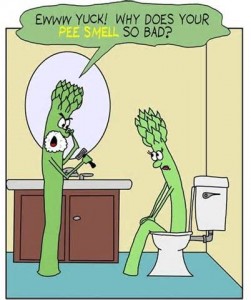 Why does asparagus make your pee smell bad?
Why does asparagus make your pee smell bad?
I know that I have pondered this question my whole life. However, some people may think that I am crazy. It turns out that approximately half the population finds that their urine smells bad a few hours after they’ve eaten asparagus. Asparagus has many sulfur-containing amino acids that break down during digestion. Supposedly, these are the same sulfur compounds that make skunks smell. Scientists remain divided on why this only affects half the population. Some think that half of the people have a gene that enables them to break down the sulfurous amino acids into smelly bi-products. Others think that we all digest it the same, but half of the people have a gene that enables us to smell the compounds. That may be the situation for me, considering that I inherited my Dad’s big, sensitive honker.
Does eating raw oysters improve one’s sex life?
Unfortunately, there is no scientific basis for this belief. However, there are some therapists who recommend eating oysters when treating patients for sexual disorders, most likely due to there high iron content.
Why does smoking and coffee make you want to go to the bathroom?
I know this is very common for many people. Cigarette smoking and caffeine both stimulate your parasympathetic nervous system, which controls your digestion. When receptors in your nervous system are stimulated, your intestines start churning. If food has already been processed, typically in the morning, you may feel the need to go to the bathroom, #2.
Why do artichokes enhance sweet flavors?
For this one, I don’t know if it affects everyone, but it surely effects my taste buds. If you’re not sure, try eating 1 large artichoke and taste water for sweetness. I did this test on Brian, my husband, and he thought that I added sugar to the water. Artichokes cause chemical changes in the mouth which affects the taste buds in most people by enhancing sweet flavors. The active compounds in artichokes that are responsible for this change are chlorogenic acid and cynarin. They suppress our sour and bitter taste receptors, which enhance our sweet one. Due to this taste change, wine enthusiasts are recommended to avoid artichokes while wine tasting.
















Leave a Reply